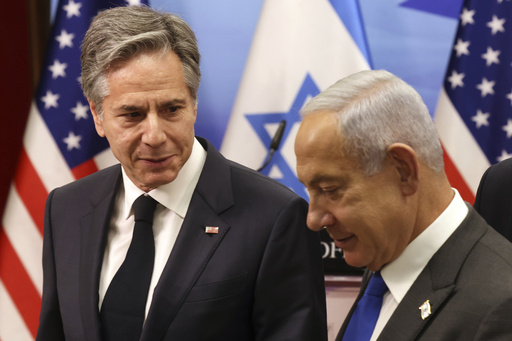
U.S. and Arab mediators are reportedly close to reaching an agreement to end the war in Gaza and secure the release of hostages taken by Hamas in a recent attack. The negotiations, which have been ongoing for months, gained urgency following threats of retaliation from Iran and Lebanon’s Hezbollah after two of their top militants were killed in Israeli strikes.
During talks in Qatar last week, mediators proposed a bridging plan, leading U.S. and Israeli officials to cautiously express optimism. However, Hamas has shown less enthusiasm, stating that the latest proposal differs from previous ones they had accepted.
U.S. Secretary of State Antony Blinken is back in the region for further discussions, and Israeli Prime Minister Benjamin Netanyahu is set to meet him on Monday. A delegation from Israel has been sent to Cairo, with additional high-level talks expected in Egypt later this week.
A cease-fire agreement holds significant stakes as it would bring an end to the deadliest conflict between Israelis and Palestinians, which has led to the deaths of over 40,000 Palestinians in Gaza. The majority of the population has been displaced, living in dire conditions with essential services in collapse and entire neighborhoods destroyed.
The attack by Hamas on Oct. 7 resulted in the death of around 1,200 people, mostly civilians, and the abduction of approximately 250 hostages. Currently, around 110 hostages remain in Gaza, with concerns raised by Israeli authorities about their safety.
Lebanon’s Hezbollah has been launching attacks on Israel since the conflict began, triggering a cycle of violence, displacing thousands on both sides of the border. Iran-backed groups in other regions have also targeted Israeli interests in solidarity with the Palestinians.
Sticking points in the negotiations include issues such as the release of prisoners, terms of a lasting cease-fire, and Israel’s demand for military presence along the borders. President Joe Biden and the U.N. Security Council have backed a three-phase proposal, but disagreements persist over details and timelines.
The decision to implement a cease-fire rests with Israeli Prime Minister Netanyahu and Hamas leader Yahya Sinwar, with both facing domestic pressures and hardline factions within their constituencies. Despite exhaustion and desperation for peace in Gaza, breakthroughs have been elusive, with challenges remaining on multiple fronts.
Aid organizations have stressed the urgent need for a cease-fire to facilitate humanitarian assistance to Gaza and prevent a worsening humanitarian crisis. Rebuilding the region post-conflict is projected to be a long and costly process, with the United Nations estimating it could take over a decade and substantial financial resources.
In Israel, where public sentiment varies, particularly regarding the government’s response to the conflict, support for ending the hostilities and securing the release of hostages is gaining momentum. Concerns over security and intelligence failures have also fueled calls for political change within the country.
